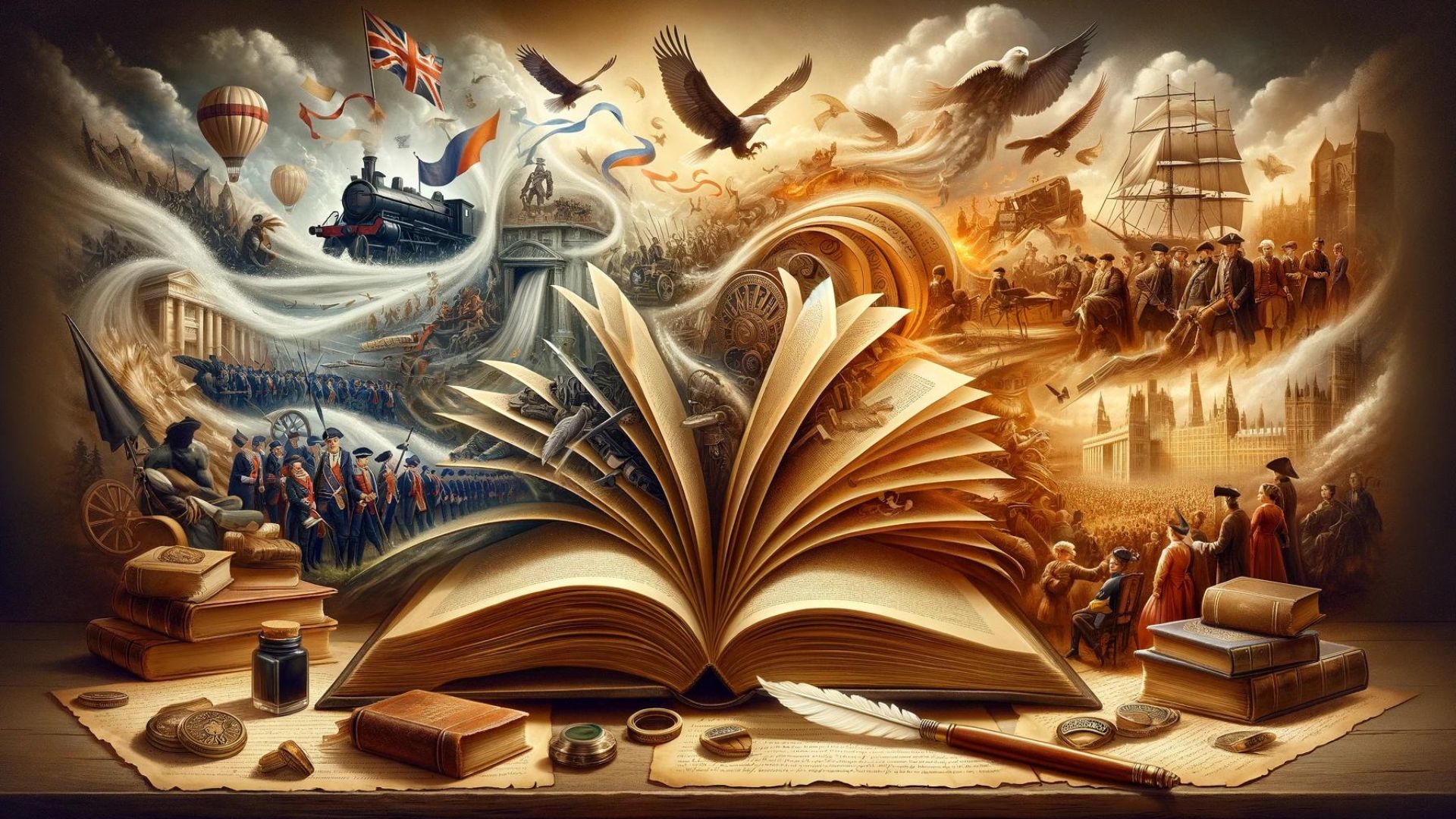- History: The Unsung Co-Author
- Echoes of the Past: How History Shapes Characters
- Plot Twists from Real Life: Historical Events as Inspiration
- Themes That Transcend Time: History’s Enduring Impact
- Your Turn: Uncover the Layers of Meaning
- Why Should You Care?
- Key Takeaways
- Keywords & Definitions
- Frequently Asked Questions (FAQs)
- Myth Buster
- Let’s Talk!
Have you ever read a book or watched a movie that transported you to another time and place? Felt the weight of history on the characters’ shoulders? That’s the power of literature – it’s not just a collection of words; it’s a reflection of the human experience, often shaped and molded by the tides of history.
History: The Unsung Co-Author
Think of historical events as silent co-authors, whispering their secrets into the ears of writers and artists. Wars, revolutions, social movements – these events leave indelible marks on society, influencing the way people think, feel, and interact. And these changes inevitably find their way into the stories we tell.
Consider the American Civil War. Its impact reverberated through literature for generations. Authors like Mark Twain, in “The Adventures of Huckleberry Finn,” grappled with the legacy of slavery and the struggle for racial equality. The war’s themes of loss, courage, and the search for identity continue to inspire writers today.
Echoes of the Past: How History Shapes Characters
Historical events often shape the very fabric of fictional characters. Their beliefs, motivations, and actions are often informed by the world around them – a world defined by its past.
In Harper Lee’s “To Kill a Mockingbird,” Atticus Finch, a lawyer defending a Black man wrongly accused of a crime, embodies the moral struggles of the Civil Rights era. His courage in the face of prejudice is a direct reflection of the historical context in which the story unfolds.
Plot Twists from Real Life: Historical Events as Inspiration
Sometimes, historical events themselves become the driving force behind a story’s plot. World War II, for instance, has been the backdrop for countless novels and films, from the harrowing “The Diary of Anne Frank” to the epic “Schindler’s List.”
These stories not only entertain but also educate, offering glimpses into a time of great upheaval and human resilience. They remind us that even in the darkest of times, hope and courage can prevail.
Themes That Transcend Time: History’s Enduring Impact
Historical events often give rise to universal themes that resonate across generations. These themes – love, loss, war, justice, and the struggle for freedom – are as relevant today as they were centuries ago.
In George Orwell’s dystopian novel “1984,” the totalitarian regime’s surveillance and control mirror the anxieties of the Cold War era. Yet, the novel’s warnings about the dangers of unchecked power remain chillingly relevant in our own digital age.
Your Turn: Uncover the Layers of Meaning
- Dig Deeper: The next time you read a book or watch a movie, consider the historical context. Research the events that might have influenced the story, and see how it adds depth to your understanding.
- Explore Different Eras: Seek out literature from different historical periods. You’ll be amazed at how the stories reflect the unique challenges and triumphs of each era.
- Join the Conversation: Discuss historical events with friends, family, or book clubs. Share your insights and interpretations, and learn from others.
Literature is a bridge that connects us to the past, offering a unique perspective on the events that shaped our world. By exploring the historical influences on the stories we tell, we not only gain a deeper appreciation for literature but also a richer understanding of ourselves.
Why Should You Care?
Understanding the historical context of literature enriches your reading experience and deepens your connection to the world around you:
- Deeper Understanding: By knowing the historical events that inspired a work, you gain a richer understanding of its characters, themes, and messages.
- Cultural Insight: Literature is a reflection of the time and place it was written. It offers a glimpse into the values, beliefs, and struggles of different societies.
- Critical Thinking: Analyzing the historical context of literature encourages critical thinking and the ability to see connections between past and present events.
- Empathy and Understanding: Stories set in different historical periods can help us understand and empathize with people from different backgrounds and experiences.
Key Takeaways
- History as Inspiration: Historical events often serve as a springboard for writers and artists.
- Characters Shaped by History: Fictional characters are influenced by the social, political, and cultural context of their time.
- Plots Driven by Events: Real-world events can become the driving force behind a story’s plot.
- Universal Themes: Historical events give rise to themes that resonate across time, like love, loss, war, and justice.
- Literature as a Mirror: Literature reflects the human experience, shaped and molded by the forces of history.
Keywords & Definitions
- Historical Influence: The impact of past events on the creation and interpretation of literature.
- Literature and History: The intricate relationship between historical events and the stories we tell.
- Historical Context: The social, political, and cultural circumstances surrounding a particular event or period.
- Character Development: The process of creating complex and believable fictional characters.
- Plot: The sequence of events in a story.
- Theme: The underlying message or idea explored in a work of literature.
- Social Commentary: The use of literature to critique or comment on social issues and injustices.
- Historical Fiction: A genre of literature that blends historical facts with fictional elements.
- Dystopian Literature: A genre that explores imaginary societies where oppressive control and illusion of a perfect society are maintained through corporate, bureaucratic, technological, moral, or totalitarian control.
- Civil Rights Era: A period in American history marked by the struggle for racial equality and social justice.
Frequently Asked Questions (FAQs)
- Do all works of literature reflect historical events? Not all explicitly, but most are influenced by the author’s experiences and the world around them, which is shaped by history.
- How can I determine the historical context of a book? Research the time period when the book was written, the author’s life, and any major events happening at the time.
- Is it necessary to know the historical context to enjoy a book? Not necessarily, but understanding the context can deepen your appreciation and add layers of meaning to the story.
Myth Buster
- Myth: Historical fiction is always accurate.
- Reality: While historical fiction often incorporates real events and figures, it also includes fictional elements for storytelling purposes. It’s important to distinguish between fact and fiction.
- Myth: Literature that doesn’t explicitly address historical events is irrelevant to history.
- Reality: Even seemingly apolitical stories can offer insights into the social norms, values, and beliefs of a particular time period.
Let’s Talk!
- Can you think of a book or movie where a historical event plays a crucial role in the story? How did it impact the characters and the plot?
- Have you ever felt a personal connection to a historical event through a work of literature?
- In what ways do you think literature can help us understand and learn from the past?
Share your thoughts and experiences in the comments below! Let’s delve deeper into the fascinating world where history and literature intersect.










0 Comments